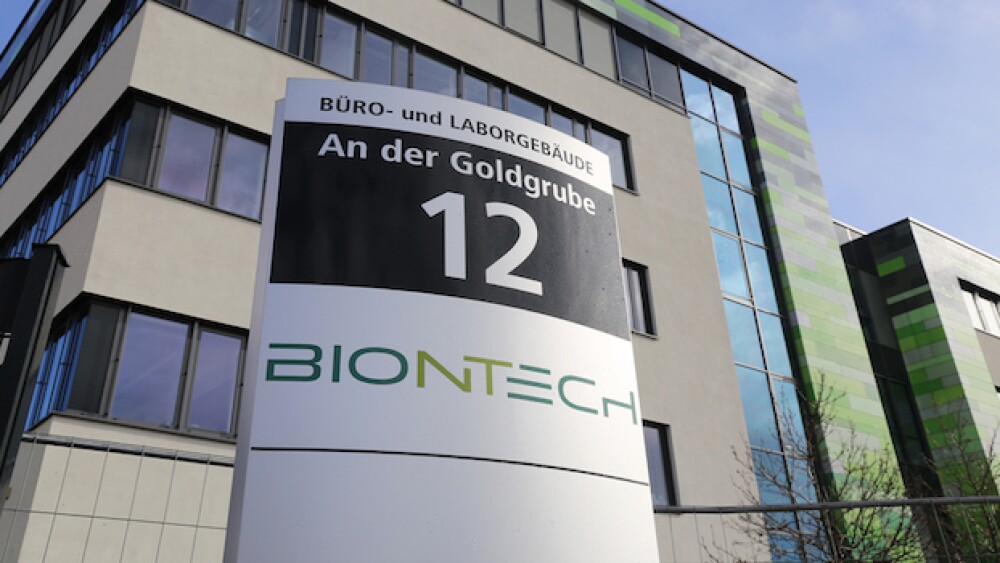The German biotechnology company has teamed with Suzhou-based biotech MediLink Therapeutics to develop next-generation antibody-drug conjugates for cancer.
Pictured: Sign outside BioNTech’s building in Germany/iStock, U. J. Alexander
BioNTech on Thursday entered into a strategic research collaboration and worldwide licensing agreement with Suzhou-based biotech MediLink Therapeutics to develop next-generation antibody-drug conjugates for cancer.
Under the terms of the deal, BioNTech will make an upfront payment of $70 million and pledge additional development, regulatory and commercial milestones, with a potential contract value of more than $1 billion.
In return, MediLink will grant the German biotech the exclusive global right to develop, manufacture and commercialize its antibody-drug conjugate (ADC) assets targeting the HER3 protein, though it will retain ownership of these molecules in the Greater China region, including Mainland China, Hong Kong and Macau.
HER3 is a tyrosine kinase receptor that is often over-expressed in several solid tumors, including breast, ovarian and prostate cancers. According to MediLink’s announcement on Thursday, HER3 is a well-validated target in cancer and is closely associated with tumor metastasis and disease progression.
MediLink is developing HER3-directed ADCs using its proprietary TMALIN platform, which “can solve the defects of the existing ADC technology,” according to the company’s website. These shortcomings include the need to be absorbed by lysosomes, which limits the antibody selection, as well as their large molecule size—which lower permeability and tumor enrichment, leading to compromised therapeutic effect.
TMALIN, which stands for tumor microenvironment activable linker, sidesteps these challenges by using a unique ADC structure with novel digestion characteristics. These allow the therapeutic to exert its effects on the tumor’s microenvironment, inducing a high concentration of the payload in tumor tissue and achieving strong cancer-killing activity.
Thursday’s MediLink deal is the latest development in BioNTech’s ongoing efforts to deepen its cancer portfolio, particularly in the HER domain.
In April 2023, the company dropped $170 million in an upfront payment and promised up to $1.5 billion in milestones for two topoisomerase-1 inhibitor-based ADCs developed by Shanghai-based Duality Biologics. The more mature of the two assets, dubbed DB-1303, targets HER2-expressing cancers.
The partners pushed DB-1303 into Phase III development in September 2023, seeking to target HER2-low, HR-positive metastatic breast cancer.
In building out its HER portfolio, BioNTech is looking to compete with the alliance of Daiichi Sankyo and AstraZeneca, whose HER2-targeting ADC Enhertu (trastuzumab deruxtecan) has become one of the cornerstone therapies in breast cancer. Enhertu is also approved in certain patients with metastatic non-small cell lung cancer (NSCLC) and gastric or gastroesophageal junction adenocarcinoma.
Outside of its partnership with AstraZeneca, Daiichi Sankyo is also working on HER3 and last month announced that its candidate patritumab deruxtecan demonstrated a nearly 30% objective response rate in patients with EGFR-mutated NSCLC. The company is preparing to file a Biologics License Application in the second half of fiscal year 2023.
Tristan Manalac is an independent science writer based in Metro Manila, Philippines. He can be reached at tristan@tristanmanalac.com or tristan.manalac@biospace.com.






